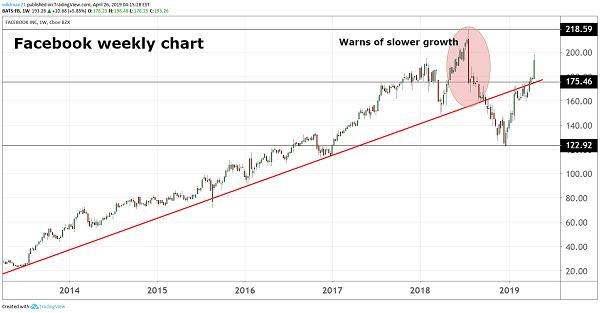Stockwatch: Why Facebook is still a great investment story
Investors have shrugged off a multi-billion dollar regulatory fine to focus on growth stock credentials.
26th April 2019 10:21
by Edmond Jackson from interactive investor
Investors have shrugged off a multi-billion dollar regulatory fine to focus on growth stock credentials.

Can Facebook (NASDAQ:FB) "climb a wall of worry" about increasing regulatory action? Investors cheered its first-quarter 2019 results with a near-6% rise in its Nasdaq-listed stock to $193. It comes despite global media headlines seizing on a potential $3 billion to $5 billion fine (£2.3 billion to £3.9 billion) by the US Federal Trade Commission (FTC) over Facebook's privacy and data practices.
That's a $3 billion accrual within other current liabilities on the balance sheet and, as is typically the case with investigations, there’s no guidance as to when it will be resolved.
On present evidence it looks as if the sheer public appeal of Facebook's social media and messaging platforms can outweigh regulatory risks. But investors must pay attention now that Facebook has a reputation as a serial offender and will face increased regulatory challenges in the EU over the next couple of years. Antitrust issues in the US loom, too – according to the outcome of the 2020 election.

Source: TradingView Past performance is not a guide to future performance
Might data restrictions affect marketing precision?
The crux relates to advertising, which dominates Facebook's revenue profile. What distinguishes this group, being the world's premier social media network including Instagram and WhatsApp, is the extent of data that enables specialist targeting – making adverts far more effective than, say, TV.
The civic fine far outstrips a $22.5 million slap to Google in 2012 for mis-representing privacy assurers, although the issue is becoming politicised, with some US Democrats calling for executives including CEO Mark Zuckerberg to be held personally responsible.
If the FTC is seen to be ineffective, then Congress must act. For context, however, this may chiefly be political opportunism.
Public perception has taken some hits - Instagram and Facebook Light users' passwords having been stored in plain text on internal Facebook servers, which led to a lapse in security. Then one of the shooters in the New Zealand mosque massacre in March live-streamed the attack, with Facebook responding slowly to take the video down.
Yet daily users are up 8% year-on-year to 1.56 billion, led by growth in India, Indonesia and the Philippines. A few people grow weary of social media but, as I see it, a substantial majority relies on it with scant fear.
An unparalleled audience for advertisers
The Facebook family includes Instagram, WhatsApp and Messenger: some 2.7 billion users and more than 2.1 billion people using at least one such media every day. Such breadth constitutes a genuine moat, assuming management responds capably to the security/privacy issues in regulatory focus.
In the Q1 earnings call, Zuckerberg said:
"In our digital lives we need both public and private spaces...Facebook and Instagram have become the digital equivalents of the town square...I think there also needs to be a digital equivalent of the living room – a platform just as built out with all of the ways you’d want to interact privately."
Thus, messaging will be made as secure as possible, encrypted, so not even Facebook can see what users share. The time horizon for achieving this "central focus" is the next five years or longer.
Data storage security will also be improved, avoiding countries where it might be improperly accessed. If implemented successfully, this notion of "a digital town square but also digital living room" could strike the right balance to mitigate scandals/fines while retaining strong appeal for advertisers – being the world's largest social media platform.
Premium credentials for a global growth stock
Showing how advertisers' confidence in Facebook is axiomatic, Q1 total revenue was $15.1 billion, up 26% or 30% in constant currency, with total ad revenue up similarly to $14.9 billion - a slight beat on consensus.
Global diversity is strong with the US and Canada showing 30% ad growth, Asia Pacific 28% and rest-of-world 23%, Europe somewhat more pedestrian at 21% albeit in part due to currency headwinds.
Mobile advertising revenue constitutes 93% of total ad revenue, and is up 30% year-on-year in Q1 to $13.9 billion, with solid growth across all regions. The revenue base continues to broaden as more businesses advertise with the group – the top 100 advertisers representing less than 20% of total ad revenue.
Efforts are underway to better monetise Instagram and WhatsApp, acquired in 2012 and 2014: lately Instagram has introduced a shopping feature taking a commission on sales, and its advertising revenues are expected to soar from $4 billion in 2017, over $26 billion in 2021.
WhatsApp proposes to introduce payment services and has a blockchain division to launch its own digital coin to encourage spending on its apps.
Below top line variables, the average price per ad eased 4%, reflecting an ongoing shift towards ads within Facebook Stories and regions that monetise at lower rates.
A more concerning issue is an 80% hike in expenses to $11.8 billion inclusive of the $3 billion accrual, although the operating margin was a robust 22% (compared with around 13% for the wider US market) that would have been 20 percentage points higher absent the accrual.
Full-year expenses are now expected to grow by 47% to 55% on 2018, versus guidance for 40% to 50%, the accrual bill accounting for 10 percentage points of this growth – albeit still guiding the core expense growth rate up modestly.
So, there is an attractive valuation discrepancy, how Facebook's business model enjoys inherently superior margins as well as revenue growth credentials, compared with many other US stocks typically on (normalised) forward price/earnings (PE) multiples in the low 20s. This also offers leeway to absorb rising costs.
| Facebook Inc: Q1 2019 financial highlights | |||||||
|---|---|---|---|---|---|---|---|
| $ million | Three months ended 31 March | Year on Year Change | |||||
| 2019 | 2018 | ||||||
| Revenue | |||||||
| Advertising | 14,912 | 11,795 | 26% | ||||
| Payments/other fees | 165 | 171 | -4% | ||||
| Total revenue | 15,077 | 11,966 | 26% | ||||
| Total costs and expenses | 11,760 | 6,517 | 80% | ||||
| Income from operations | 3,317 | 5,449 | -39% | ||||
| Operating margin | 22% | 46% | |||||
| Taxation | 1,053 | ||||||
| Effective tax rate | 30% | ||||||
| Net income | 2,429 | 4,988 | -51% | ||||
| Diluted earnings per share ($) | 0.89 | 1.69 | -50% |
Source: Company REFS
Facebook's PE has pretty much halved from over 50 times in early 2014 and compares with Amazon (NASDAQ:AMZN) on around 90 times earnings, if fairly similar to Twitter (NYSE:TWTR). It's roughly in line with the US market multiple, though enjoys a return on capital employed and gross margin double those of the index.
Q1 capital expenditure was $4 billion chiefly on data centres and servers, office facilities and network infrastructure.
A virtue is this amply covered by $5.3 billion free cash flow and the group ending March with $45.2 billion cash and investments, enabling $521 million of the company's own shares to be bought back during the three months alone.
Full-year capex is guided down a billion dollars or so, to $17 billion to $19 billion.
Q1 normalised earnings per share were $1.89, also a beat on consensus for $1.62, relative to 0.89 in the table.
Relatively "high beta" stock credentials
Mind that Facebook is among the FAANG stocks, prone to lead the market when risk-on/risk-off sentiment shifts. Holders need to be steeled for above-average volatility - in the latter part of 2018 Facebook plunged 38% from $212 to $131 as of Christmas Eve, before rebounding 47% to $193.
With a "fresh money" perspective you could therefore take a multi-year "buy the drops" approach to accumulate a holding, albeit at the risk of engaging a market timing approach that never quite works. Possibly the stock will ease again once excitement over strong Q1 results abates, though my sense is: Long-term buy.
Edmond Jackson is a freelance contributor and not a direct employee of interactive investor.
These articles are provided for information purposes only. Occasionally, an opinion about whether to buy or sell a specific investment may be provided by third parties. The content is not intended to be a personal recommendation to buy or sell any financial instrument or product, or to adopt any investment strategy as it is not provided based on an assessment of your investing knowledge and experience, your financial situation or your investment objectives. The value of your investments, and the income derived from them, may go down as well as up. You may not get back all the money that you invest. The investments referred to in this article may not be suitable for all investors, and if in doubt, an investor should seek advice from a qualified investment adviser.
Full performance can be found on the company or index summary page on the interactive investor website. Simply click on the company's or index name highlighted in the article.
Disclosure
We use a combination of fundamental and technical analysis in forming our view as to the valuation and prospects of an investment. Where relevant we have set out those particular matters we think are important in the above article, but further detail can be found here.
Please note that our article on this investment should not be considered to be a regular publication.
Details of all recommendations issued by ii during the previous 12-month period can be found here.
ii adheres to a strict code of conduct. Contributors may hold shares or have other interests in companies included in these portfolios, which could create a conflict of interests. Contributors intending to write about any financial instruments in which they have an interest are required to disclose such interest to ii and in the article itself. ii will at all times consider whether such interest impairs the objectivity of the recommendation.
In addition, individuals involved in the production of investment articles are subject to a personal account dealing restriction, which prevents them from placing a transaction in the specified instrument(s) for a period before and for five working days after such publication. This is to avoid personal interests conflicting with the interests of the recipients of those investment articles.